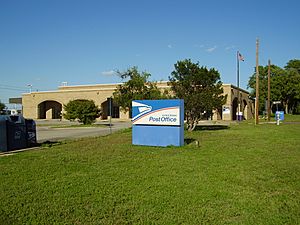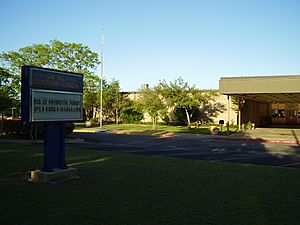Oak Hill, Austin, Texas facts for kids
Quick facts for kids
Oak Hill
|
|
|---|---|

A post office in Oak Hill
|
|
| Country | United States |
| State | Texas |
| County | Travis |
| Time zone | UTC-6 (Central (CST)) |
| • Summer (DST) | UTC-5 (CDT) |
| ZIP codes |
|
| Area code(s) |
|
Oak Hill is a group of neighborhoods in southwestern Austin, Texas, United States. It's an "unincorporated community," which means it's not officially a city or town on its own, but it's still a recognized place where people live.
Contents
History of Oak Hill
The area we now call Oak Hill was first known as Live Oak Springs in the 1800s. In 1835, William Cannon received this land from the Mexican government. His land stretched between Williamson Creek and Slaughter Creek. People started settling here soon after the city of Austin was founded.
In 1846, William D. Glascock moved his family to the area, settling north of Williamson Creek. Two years later, he sold some land to John Ernest Mowinkle, a Norwegian immigrant. This is when the community really began to form.
Changing Names and Growing Industries
In 1865, people tried to rename the community Shiloh, after a famous Civil War battle. But in 1869, it was named Oatmanville instead. After the Civil War, many settlers came to Oatmanville because of the cedar forests. There was a high demand for wood, especially from the Appalachian Mountains. This demand even caused small fights between woodcutters. In 1870, a post office called Oak Hill was opened, but the community itself didn't officially take that name right away.
Building the Capitol and Population Growth
During the 1880s, the Texas State Capitol building was being constructed in Downtown Austin. Stone quarries near Oatmanville were used for the capitol, which made the community's economy boom! This project also led to the creation of the Austin and Oatmanville Railway. This train line was built to carry limestone from the community to the city, but it was stopped in 1888.
By 1904, Oak Hill's population grew to over 200 people. This number doubled by the 1970s. In 1910, the local post office closed, and mail was sent to Austin instead. Nearly a century later, in 2000, the area known as Oak Hill officially became part of Austin's city limits.
Population Changes Over Time
When Oak Hill was first settled in the 1830s and 1840s, not many people lived there. But as demand for limestone and cedar wood grew in the late 1800s, the population quickly increased. It reached 200 people by 1904. The population then doubled to 400 by the 1970s. It grew even faster when new suburban homes were built. By 1990, Oak Hill had 11,572 residents.
In the next ten years, the population of the Oak Hill area grew more than twice as fast as the larger Austin area. West Oak Hill grew three times faster than Austin during that time! By 2000, the total population of the Oak Hill planning area was 24,233 people.
Geography of Oak Hill
Oak Hill is known for its hilly terrain. You'll often see rimrock structures made of limestone here. The community sits above two important underground water sources called the Edwards and Trinity aquifers. This means there are many caves, sinkholes (holes in the ground), and springs. These features help refill the underground water supply.
Creeks and Wildlife
Barton, Slaughter, and Williamson creeks all flow through Oak Hill. These creeks eventually lead to the nearby Colorado River. Along these creeks, you can find riparian woodlands, which are forests that grow near water.
Oak Hill is also home to some special birds. The golden-cheeked warbler and the black-capped vireo are two threatened bird species that live in certain parts of Oak Hill.
Understanding Oak Hill's Boundaries
Since Oak Hill is not an official city, it doesn't have strict legal borders. This group of neighborhoods is centered around where U.S. Route 290/TX-71 and Williamson Creek meet. This spot is about 8 miles (13 km) southwest of downtown Austin.
The Oak Hill Association of Neighborhoods (OHAN) helps define the area. Their definition includes neighborhoods from Travis Country in the northwest, down Brodie Lane to the Travis/Hays County line. It then follows the county line south to Highway 290 West, and includes neighborhoods along Circle Drive, Thomas Springs Road, and Southwest Parkway. This area covers parts of six ZIP codes and 89 neighborhoods, including Circle C Ranch. However, only 29 neighborhood groups are members of OHAN.
The city of Austin also defines "West Oak Hill" and "East Oak Hill" as neighborhood planning areas. These areas are next to U.S. Route 290, stretching from Circle Drive to just east of Texas State Highway Loop 1. This planning area is Austin's largest, covering about 11,123 acres (45.01 km2).
| Climate data for Sunset Valley | |||||||||||||
|---|---|---|---|---|---|---|---|---|---|---|---|---|---|
| Month | Jan | Feb | Mar | Apr | May | Jun | Jul | Aug | Sep | Oct | Nov | Dec | Year |
| Record high °F (°C) | 90 (32) |
99 (37) |
98 (37) |
99 (37) |
104 (40) |
109 (43) |
109 (43) |
112 (44) |
112 (44) |
100 (38) |
91 (33) |
90 (32) |
112 (44) |
| Mean daily maximum °F (°C) | 62 (17) |
65 (18) |
72 (22) |
80 (27) |
87 (31) |
92 (33) |
96 (36) |
97 (36) |
91 (33) |
82 (28) |
71 (22) |
62 (17) |
74 (23) |
| Mean daily minimum °F (°C) | 41 (5) |
45 (7) |
51 (11) |
59 (15) |
67 (19) |
72 (22) |
74 (23) |
75 (24) |
69 (21) |
61 (16) |
51 (11) |
42 (6) |
59 (15) |
| Record low °F (°C) | −2 (−19) |
−1 (−18) |
18 (−8) |
30 (−1) |
40 (4) |
51 (11) |
57 (14) |
58 (14) |
41 (5) |
30 (−1) |
— | 4 (−16) |
−2 (−19) |
| Average precipitation inches (mm) | 2.22 (56) |
2.02 (51) |
2.76 (70) |
2.09 (53) |
4.41 (112) |
4.33 (110) |
1.88 (48) |
2.35 (60) |
2.99 (76) |
3.88 (99) |
2.96 (75) |
2.40 (61) |
34.29 (871) |
| Source: Weather.com | |||||||||||||
Transportation in Oak Hill
The Texas Department of Transportation (TxDOT) is currently planning to make Highway 290/71 bigger. This project is called the Highway 290 West project. TxDOT has created different ideas for how to expand the highway and is asking the community for their thoughts.
Oak Hill also has a "Park and Ride" location. This is a place where people can park their cars and then take a bus into the center of Austin. It's a way to help people who live in Southwest Austin get to work or other places in the city. As of December 2013, the Park and Ride is located at the Austin Community College District Pinnacle campus.
Education in Oak Hill
The schools in the Oak Hill area are part of the Austin Independent School District.
Public Schools
Here are some of the public elementary schools that serve Oak Hill:
- Boone Elementary
- Cowan Elementary
- Galindo Elementary
- Kiker Elementary
- Kokurek Elementary
- Menchaca Elementary
- Mills Elementary
- Oak Hill Elementary
- Patton Elementary
Middle schools serving Oak Hill include:
- Bailey Middle School
- Covington Middle School
- O. Henry Middle School
- Small Middle School
High schools serving Oak Hill include:
- Akins High School
- Austin High School
- Bowie High School
- Travis High School
Many of these schools were built in the late 1900s. For example, Oak Hill Elementary School was built in 1974, and Bowie High School was built in 1988.
Private Schools in the Area
There are also several private schools in the Oak Hill area:
- Regents School of Austin (for students from kindergarten to 12th grade)
- Austin City Academy (for students from kindergarten to 12th grade)
- Austin Waldorf School (for students from kindergarten to 12th grade)
- St. Andrew's Episcopal School (their upper campus for grades 9-12 is in Oak Hill)
- Cedars Montessori School of Oak Hill
The Austin Waldorf School opened in 1980, and Regents School of Austin opened in 1992.
Community Colleges
Austin Community College has a campus in Oak Hill called the ACC Pinnacle Campus.
Public Libraries
The Austin Public Library operates the Hampton Branch at Oak Hill. This library is located at 5125 Convict Hill Road. It's about 8,400 square feet (780 m2) in size and opened on April 26, 1997.
Notable Person from Oak Hill
- Bob Trocolor (1917–1984) – He was born in Oak Hill. He played in the NFL, coached college football and basketball, and even acted in movies!
 | Anna J. Cooper |
 | Mary McLeod Bethune |
 | Lillie Mae Bradford |



